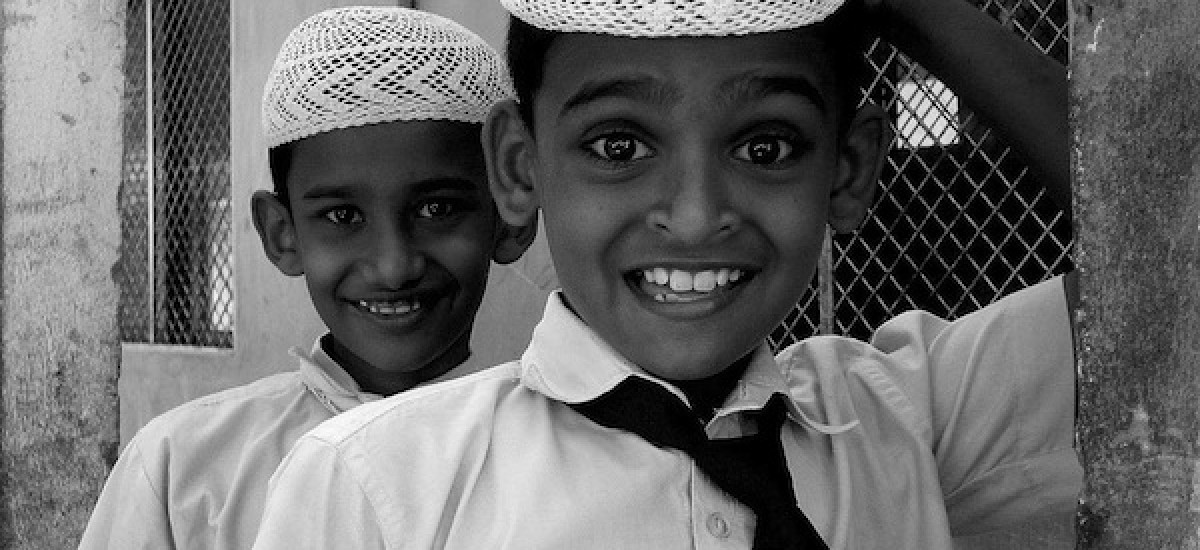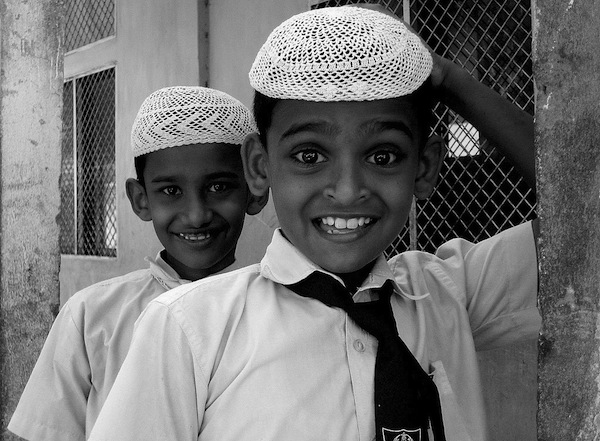Photo by Aufidius, via The untold story of a child
The recent debate around the anti-halal movement, with its echoes of anti-Tamil sentiment of the post-independence period (‘Tamils get more government jobs,’ ‘Tamils have access to better education than Sinhalese’), is on the surface a conflation of religion, nationalism, class and various other factors. Beneath the complexity of the rhetoric, at least to me, are feelings of disaffection, great sadness, loss of meaning of what we stand for, of what we are as a nation, as a people.
To attempt to make sense of it let’s scale down the scenario to a manageable, personal level. Consider this hypothetical situation: I am school age. I have a friend who, at least for now, we will call Sam – a facile Western name to free your image of him from Sri Lankan race/religion/caste and other cultural trappings that further complicate the issue. Sam is a huge cricket fan.
On most days he gets a lift to school and back with me in my father’s car. A few months later, another friend, Mo, joins us on the ride home. Mo plays tennis and is passionate about his sport. One day Mo says the tennis team has a plan to place their logo on stationery, clothing, even on water bottles to be sold at the bookshop, at the canteen, at offices of various Mother’s Associations, and a percentage of the profits from the sale of each item would go towards the team.
‘You can’t do that,’ says Sam.
‘Yes, we can,’ says Mo. ‘We got approval from the Vice Principal.’
‘No you can’t,’ Sam repeats. ‘You can’t put the tennis name on things that don’t belong to tennis.’
‘It’s not about whether it belongs to tennis. It’s for people who want to help the tennis team. They can choose to buy something with our logo and help us.’
‘But you’re using the money you get, our money, everyone’s money, only for making tennis better.’
‘So what?’
‘Imagine if the cricket team did something like that.’
‘Why don’t you do it?’ suggests Mo.
‘We’re not like you. We have traditions. We have rules,’ snaps Sam.
There are no winners in this argument, neither Sam nor Mo concede and the situation escalates. They turn to me. ‘What do you say? Whose side are you on?’
I realise this is not about tennis or cricket or any other sport. It’s about Sam and Mo and Me. It’s about hierarchy. It’s about power. Still, I try to address the issue at hand. Mo and his tennis team are working within the rules of free market economics – it’s what all conglomerates do – they differentiate a product and use the profits for furthering their enterprise. There doesn’t appear to be any ethical issues. When I say this to Sam, he gets angry, threatens to stop riding in my father’s car, threatens to put an end to our friendship. No matter how much I try to explain why I think he’s wrong, Sam will not agree. It’s as if he doesn’t listen to what I’m saying. What can I do? What is my responsibility? How can I change this situation?
This is what I know about Sam: he cares deeply about cricket, cares for all those who care about the sport. That’s why, when we play softball in the lunch interval, Sam gives me constant encouragement, discusses strategy and passes on batting or bowling tips. That’s why in return I offer him a ride home in my father’s car. Most of the time he comes along. Sometimes he disappears when the bell rings. That happens when boys tease him – for being slow, for being stupid, for having worn shoes, torn backpack or threadbare clothing. He can’t face up to me when he’s feeling vulnerable. I’m not what you’d call a bully but when there is fun to be had at the expense of Sam, I take the chance to appear funny in front of the other boys. Regardless of my indiscretions, on the college grounds and in my father’s car, we’re friends.
Unlike Sam, Mo is well off. He’s sophisticated, witty and mannered. When Mo and I trade stories about trips overseas, computer games or tennis, Sam is quiet. His poverty denies him these experiences and it’s obvious he feels uncomfortable at not being able to contribute. He probably feels I don’t value him as much as I do Mo. We make no attempt to include him in the conversation. But when cricket is discussed, Sam tries to dominate the conversation. It’s almost an overreaction to cover up his low self-esteem. He doesn’t listen to the arguments we present. ‘I know I’m right,’ is something he says often and he probably feels he has the license to behave this way because cricket is considered prestigious. It’s steeped in the traditions of our school, for various reasons (mostly petty and political) the authorities have invested a sense of primacy of cricket above all other sports. It’s the one credential Sam possesses, the only medallion he could produce to prove his worth in the perceived contest of who’s who in the car. It’s such a large part of his identity that any criticism of cricket is a personal insult to Sam.
Winning the Big Match only made him worse. The ensuing celebration only convinced him that cricket, and by extension he, was better than Mo and me. Naturally, conversation in the car became competitive. As The Big Match faded in our memories Sam became bitter. He reminded us of that victory whenever he felt insecure. Then came the day Mo told us of the tennis team and its endorsement deal. Now we don’t talk to each other. We battle.
When I watch science shows on TV, about organisms growing in petri dishes or nature documentaries where herds of gazelle struggle to survive on the African savannah, I realise every living thing reacts in response to its environment, to its society. A lone wolf, the most dangerous wolf of them all, is the outsider disaffected with its community, thrust aside to find its own life.
But we’re not animals. We live in a civilised society. A democracy. Where no human is above another. Yet even in the closed, controlled environment of my father’s car our animal instincts come to the fore – Sam and Mo jostle for positions by putting on alpha airs, and me, the cunning fox, sits there listening, planning, thinking I’m smarter than these two and therefore better. Let’s face the truth. The truth is that I may use bigger words and more nuanced arguments but at the end of the day, what I am doing is saying ‘I’m the best.’
Even if I wasn’t trying to announce my superiority, even if I was honestly presenting a solution, the way I made fun of Sam in class, the way I ignored him when talking to Mo in the car have ruined the chances of getting through. My actions in the past have thwarted immediate reconciliation. No matter how much knowledge I possess, no matter what facts my intellect can conjure, I cannot convince Sam. Because to convince him, he has to accept that I’m right. He will not do that. He will always think I was playing that game – the game where I try to put him down, put him in his place beneath me – and I admit; it is what I often do. It happens automatically, unconsciously, the ego, the animal inside always wants to lead the pack. And this cycle continues. I try to subjugate Sam, Sam tries to subjugate Mo, Mo tries to subjugate me. Everyone tries to beat everyone else.
So now, the choices are clear. Democracy or dictatorship? Do I ride home in my father’s car alone, or do I ride with friends? If I keep behaving as I am, the drive home will be lonely. If I choose to ride with friends I have to do this: change my behaviour. Change my attitude. Tell myself that I, truly, am not better than anyone. Not just speak of equality but quell the ego, find contentment in the knowledge I am not exceptional, I am not superior. I am nothing. There is freedom in that state of mind. And maybe then, when one cell changes, the rest will adapt and the heat in this noxious enclosure will ease.
But then again, this is just a scenario. A simplistic hypothesis. The challenges we face are far more complex and difficult. Imagine Sam was actually a Saman, if Mo was a Mohammed? What if it was Samir and Mohan? Samantha and Monica? How differently would you read the situation for each of those names? How would your prejudices, your identity inform your comprehension of each of these people? The onus is on you. And me. Investigate. Improve. Maybe on that course we’ll also find empathy, honesty, develop sensitivity towards the poor, weak and vulnerable. To every human being. Only then will we transcend our animal nature.


